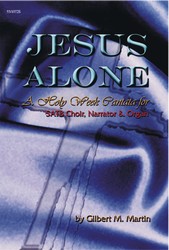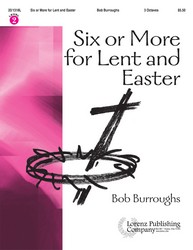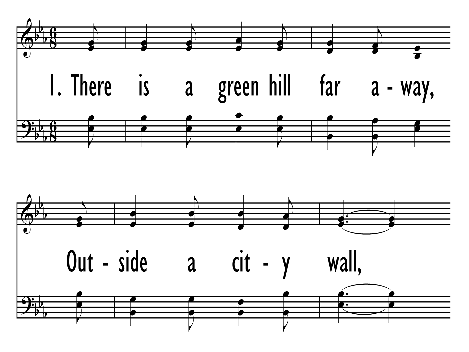- |
User Links
There Is a Green Hill Far Away

There is a green hill far away
Author: Cecil Frances Alexander (1848)Published in 714 hymnals
Printable scores: PDF, MusicXMLPlayable presentation: Lyrics only, lyrics + musicAudio files: MIDI, Recording
Representative Text
1 There is a green hill far away,
outside a city wall,
where the dear Lord was crucified,
who died to save us all.
2 We may not know, we cannot tell
what pains He had to bear,
but we believe it was for us
He hung and suffered there.
3 He died that we might be forgiv'n,
He died to make us good,
that we might go at last to heav'n,
saved by His precious blood.
4 There was no other good enough
to pay the price of sin;
He only could unlock the gate
of heav'n, and let us in.
5 O dearly, dearly has He loved,
and we must love Him too,
and trust in His redeeming blood,
and try His works to do.
Source: Our Great Redeemer's Praise #224
Author: Cecil Frances Alexander
 As a small girl, Cecil Frances Humphries (b. Redcross, County Wicklow, Ireland, 1818; Londonderry, Ireland, 1895) wrote poetry in her school's journal. In 1850 she married Rev. William Alexander, who later became the Anglican primate (chief bishop) of Ireland. She showed her concern for disadvantaged people by traveling many miles each day to visit the sick and the poor, providing food, warm clothes, and medical supplies. She and her sister also founded a school for the deaf. Alexander was strongly influenced by the Oxford Movement and by John Keble's Christian Year. Her first book of poetry, Verses for Seasons, was a "Christian Year" for children. She wrote hymns based on the Apostles' Creed, baptism, the Lord's Supper, the Ten Commandment… Go to person page >
As a small girl, Cecil Frances Humphries (b. Redcross, County Wicklow, Ireland, 1818; Londonderry, Ireland, 1895) wrote poetry in her school's journal. In 1850 she married Rev. William Alexander, who later became the Anglican primate (chief bishop) of Ireland. She showed her concern for disadvantaged people by traveling many miles each day to visit the sick and the poor, providing food, warm clothes, and medical supplies. She and her sister also founded a school for the deaf. Alexander was strongly influenced by the Oxford Movement and by John Keble's Christian Year. Her first book of poetry, Verses for Seasons, was a "Christian Year" for children. She wrote hymns based on the Apostles' Creed, baptism, the Lord's Supper, the Ten Commandment… Go to person page >Text Information
Related Texts
| First Line: | There is a green hill far away |
| Title: | There Is a Green Hill Far Away |
| Author: | Cecil Frances Alexander (1848) |
| Meter: | 8.6.8.6 |
| Language: | English |
| Notes: | Swahili translation: See "Upa mlima karibu" |
| Copyright: | Public Domain |
- (hymns)
- (hymns)
- (hymns)
- (hymns)
- (hymns)
- (hymns)
- (hymns)
- (hymns)
- (hymns)
- (hymns)
- (hymns)
- (hymns)
- (hymns)
- (hymns)
- (hymns)
- (hymns)
- (hymns)
- (hymns)
- (hymns)
- (hymns)
- (hymns)
- (hymns)
- (hymns)
- (hymns)
- (hymns)
- (hymns)
- (hymns)
- (hymns)
- (hymns)
- (hymns)
- (hymns)
- (hymns)
- (hymns)
- (hymns)
- (hymns)
- (hymns)
- (hymns)
- (hymns)
- (hymns)
- (hymns)
- (hymns)
Chinese
English
- A Child's Garden of Song #d46
- A Church of England Hymn Book: adapted to the daily services of the Church throughout the year #619
- A Hymnal and Service Book for Sunday Schools, Day Schools, Guilds, Brotherhoods, etc. #211
- A Junior's Praise #75
- A Missionary Hymn Book #219
- A New Hymnal for Sunday Schools #50
- A New Service and Tune Book for Sunday Schools. New ed. #d136
- A Selection of Spiritual Songs: with music, for the Sunday-school #126
- A Treasury of Hymns: The best-loved hymns, carols, anthems, children's hymns, and gospel songs #35
- A. M. E. C. Hymnal #151 10 shown out of 553
Notes
There is a green hill far away. Cecil F. Alexander, née Humphreys. [Good Friday.] First published in her Hymns for Little Children, 1848, p. 31, in 5 stanzas of 4 lines, and based upon the words "Suffered under Pontius Pilate, was Crucified, Dead, and Buried," of the Apostles' Creed. It is an exceedingly popular children's hymn, and is in extensive use.
--John Julian, Dictionary of Hymnology (1907)
Access an additional article on the Canterbury Dictionary of Hymnology:
Tune
THE GREEN HILL (Stebbins)George Coles Stebbins (b. East Carlton, NY, 1846; d. Catskill, NY, 1945) composed THE GREEN HILL in 1877 to accompany Cecil F. Alexander's hymn “There Is a Green Hill Far Away.” The tune was published in Gospel Hymns No.3 (1878). The slow harmonic rhythm and mostly stepwise melody build to a cli…
HORSLEY
MEDITATION (Gower)
Timeline
Arrangements
Media
- MIDI file from Calvary Songs #3
- MIDI file from The Cyber Hymnal #6763
- Audio recording from The Hymnal 1982: according to the use of the Episcopal Church #167
- MIDI file from Gloria Deo: a Collection of Hymns and Tunes for Public Worship in all Departments of the Church #532
- MIDI file from Hymns for Today: for Sunday Schools, Young People's Societies, The Church, The Home, Community Welfare Associations, and Patriotic Meetings #97
- MIDI file from Praise and Worship Hymns #23
- Audio recording from Small Church Music #282
- Audio recording from Small Church Music #282
- MIDI file from Sunday School and Revival: with Y.M.C.A. supplement #99
- MIDI file from Young People's Songs of Praise #101


 My Starred Hymns
My Starred Hymns





